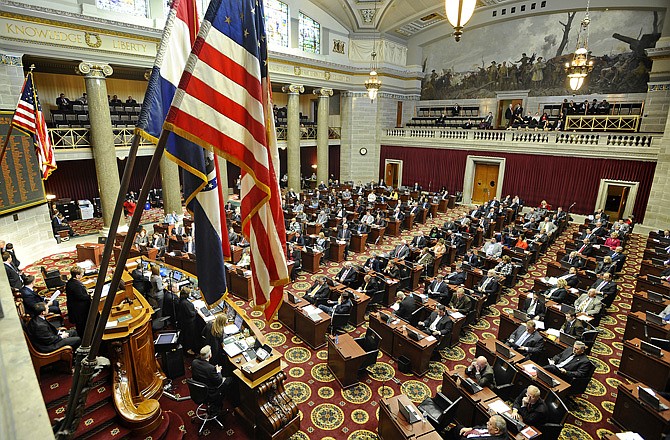Missouri lawmakers launched their 2012 session Wednesday by vowing to close the state's projected $500 million budget gap, revamp its underfunded public school system and free businesses from costly litigation and regulation.
The session that continues through May 18 will be the last go-around for the top leaders of the state House and Senate because of term limits and, for many others, it will mark the first time they are seeking re-election in recently redrawn legislative districts.
The 2012 session also comes on the heels of a largely unproductive special session last autumn, when divisions between the House and Senate scuttled a comprehensive revision of the state's business incentives.
"Some predict not much will be accomplished," Mayer, R-Dexter, said in opening remarks to the chamber. But "we must act, and do so swiftly to pass a balanced budget without a tax increase for the people of Missouri and to help put Missourians back to work in this stagnant and weak economy."
Lawmakers will have about two weeks of work before Democratic Gov. Jay Nixon presents his budget and policy proposals during his annual State of the State address on Jan. 17. The governor's budget director already has indicated that every state department is likely to take cuts. Nixon's administration and Republican legislative leaders alike have said that they hope to spare public K-12 school districts from cuts, but there have been no guarantees.
In recent years, Missouri has failed to provide the full amount called for by the formula that funds its 523 school districts. The Missouri Department of Elementary and Secondary Education has said that by the 2014 budget, and after some recalculations within the formula, Missouri could need to add more than $700 million on top of what currently is spent.
Lawmakers will attempt to tweak the formula during their 2012 session to more equitably distribute the money, but there is no agreement yet on how to do that. Some lawmakers also will be pushing for broader educational changes targeted at students in the St. Louis and Kansas City school districts, which both have lost their state accreditation. One of their chief concerns is how to implement - or whether to revise - an existing law allowing students in failing districts to transfer to other nearby schools.
Some Republican lawmakers hope to use the education debate to pursue even broader changes, such as expanding charter schools or authorizing state tax credits for scholarships that help students from troubled school districts transfer to private schools.
"Every year, we have tried to go outside the box and tried to do something with education reform," without success, said House Speaker Steven Tilley, R-Farmington. "Well in that seven years, we shuffled thousands and thousands of kids through failing schools because we weren't willing to challenge the status quo. I'm tired of that, and we're going to do something this year."
After failing to pass a proposed overhaul of Missouri's business incentives during a recent special session, Republican legislative leaders have scaled back their pro-business agenda for the 2012 session. They plan to focus on changes to the legal system for handling worker claims of injuries and discrimination. Republicans contend current policies are preventing some businesses from expanding.
"Missourians expect us to get to work, to help get them back to work," Tilley said. "And to do that, we must work to create a climate where businesses believe they can not only keep their doors open, but can grow and hire."
Democrats questioned whether the Republican business proposals actually would have much of an effect on Missouri's economy, where the unemployment rate remains a little over 8 percent.
"Most of that list doesn't really create that many jobs," said Senate Minority Leader Victor Callahan, D-Independence.
Added House Minority Leader Mike Talboy, D-Kansas City: "In discussing job development, we need to make sure that again - in our haste to become more business friendly - we do not become anti-worker."
Talboy also said lawmakers need to start looking for new sources of revenue, adding "government doesn't cut its way to prosperity."
Other priorities outlined Wednesday by various Republican leaders included changes to the panels that nominate appellate judges for gubernatorial appointments, provisions letting pharmacists refuse to prescribe drugs that can cause abortions, the development of dedicated funding sources for Missouri veterans' homes and new requirements for people to report sexual abuse of children.

